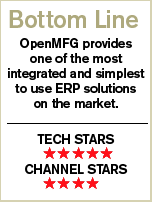Review: Open-Source ERP Scores

For those focusing on small manufacturing operations, one of the best ERP solutions comes from OpenMFG. Over the past couple of years, the open-source ERP vendor has built a small but healthy community of partners with various manufacturing and IT backgrounds.
Now at version 2.1, OpenMFG includes a CRM module and some new features that help manufacturers better track their accounts. The CRM module focuses on user activities after those users become customers and works around accounts rather than individual customers. Accounts can be created for customers, vendors, partners and competitors. In addition, the CRM module can define accounts with multiple business relationships. For instance, it is possible to define an account as a customer, a vendor, a prospect or a combination of all three.
Other CRM suites prevent customer features from having multiple business relationships because customer fields drive all the business rules and software functionality. To bypass the rules on those CRM packages, users have to trick the software by adding dummy customers or temporary fields. OpenMFG has taken an alternate approach. Essentially, OpenMFG's account field acts as the data key that drives multiple relationships. By pushing down properties given to external entities such as customers, the relationships in the accounts become easier to manipulate and customer information can be linked to competitor and partner information.

With this new data structure in place, OpenMFG also treats other internal features as accounts. For instance, tax authorities such as the state of New York or the country of Belgium are now treated as accounts. The advantage of transforming internal tax fields into accounts is that now municipal authorities can be treated as vendors. This allows OpenMFG users to write checks to them at the end of the month.
The CRM data structure goes even further by allowing users to track multiple accounts and addresses per customer. Contacts can be linked to more than one account as well. This feature is useful when tracking large manufacturers that have a large sales force at different locations.
OpenMFG's CRM also includes a new Incident Manager workbench that is integrated with a Task Manager. A new screen in the workbench allows users to query OpenMFG's database based on status. Users can track incidents by a range of dates, roles, users assigned to it and keyword searches.
OpenMFG 2.1 also arrives with new usability enhancements to the Financials module, including new features to its reporting engine. Previous versions came with a comprehensive list of ad hoc reports, which are still in place. What's new is the ability to do month-to-month, quarterly and year-to-year reporting.
OpenMFG's new Master Production Schedule helps the open-source vendor compete with larger ERP suites. The new functionality allows customers to develop forecasts for manufacturing partners and suppliers that are providing components and materials. Forecasts now can be done item by item and at the product family level.
OpenMFG costs $1,000 per user per year or $3,000 per user for a perpetual license. Partners are required to pay a $3,000 annual program fee unless a sales target is met. According to OpenMFG, partners can expect to make around $12,000 in commission on typical ERP implementations. For additional implementation services, partners can make on average as much as $30,000.
With such tremendous revenue opportunity in front of them, solution providers would do well to give OpenMFG a serious look.